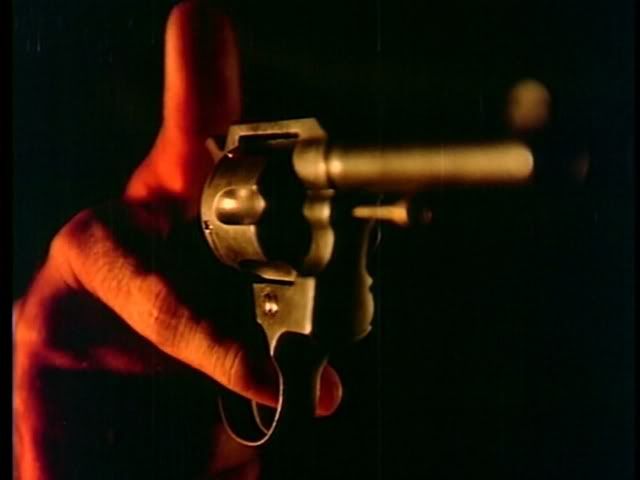
Happiness, the warm gun.
Remember how the PPCC enjoyed the moral ambiguities of the double agents in Infernal Affairs, most particularly the cop who's been undercover for so long he's becoming confused as to his moral core? And remember the absolute cuddly satisfaction of the gangster's ultimate conversion to goodness, as in Kasme Vaade? Well, in Chor Sipahee, the cop is played by a bearded Shashi Kapoor who starts to resemble more and more Naseeruddin Shah (especially in the first item number). And the gangster is played by Vinod Khanna with an awesome haircut, still wearing those high-heeled shoes from Parvarish. Naturally this is already proving to be wonderful.
Further particulars on Chor Sipahee (Thief-Cop): crime lairs without walls, a Saudi prince stereotype who also wears riding boots (?) and has a striking resemblance to Shah Rukh Khan, the fifteen minutes of fame of Macmohan - where we learn that he is very wiry and a fast runner and can do more than just dress up the background, and the altogether bizarre aesthetic experience of Shashi Kapoor's costume design (provided, of course, by his wife, Jennifer Kapoor).
We really need to get the costume design thing off our chest first, or else this will review will never make any sense. Bollywood Fugly, are you listening?
Shashi's sipahee (cop, soldier, trooper), Shankar, is introduced to us as a bearded ragamuffin chain-smoking undercover world-weary bad-ass. He even twists his wrist in weary resignation and smiles sadly - all very much a la Naseer in Naajayaz. It's delightful! The first item song is sublime, where Shankar sings, "Don't ask me my name. Even I don't know who I am," and then, when the melody becomes painfully, beautifully melancholy, tells the pickpocket on the train, "You were not what you turned out to be. You've become such a coward." (And the ultimate poignancy is how the lyrics seem directed to Shankar's father! See below.) Oh, the humanity!
Unfortunately, the Cruelty of the Internet has struck again and we at the PPCC cannot show you this truly lovely, evocative, masala perfection song because no one has had the forethought of uploading it to YouTube. Hmm.
Anyway, we were talking about aesthetics. First, Shashi Kapoor playing Naseeruddin Shah:
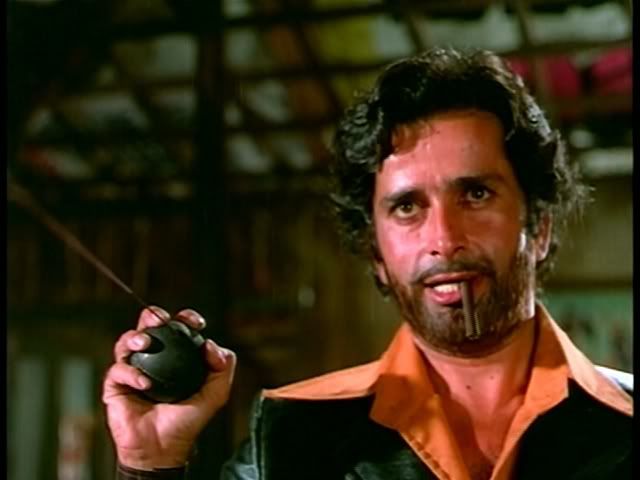
An unwashed, proletarian Shashi? Who knew he could pull it off so well!
Then, Shashi Kapoor playing his older brother Raj Kapoor, circa Awaara. That is, with a moustache, matinee idol soft focus close-ups, and cigarette smoke slowly curling from his lips. That's choice, right there.
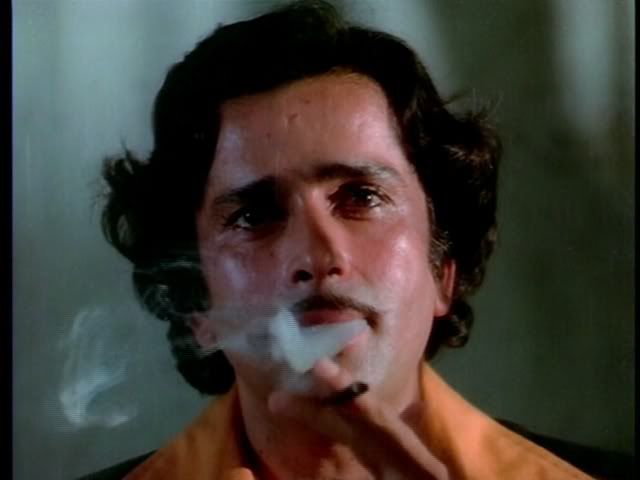
Of all the gin joints in all the world...
Then, briefly, a little bit Sufi.
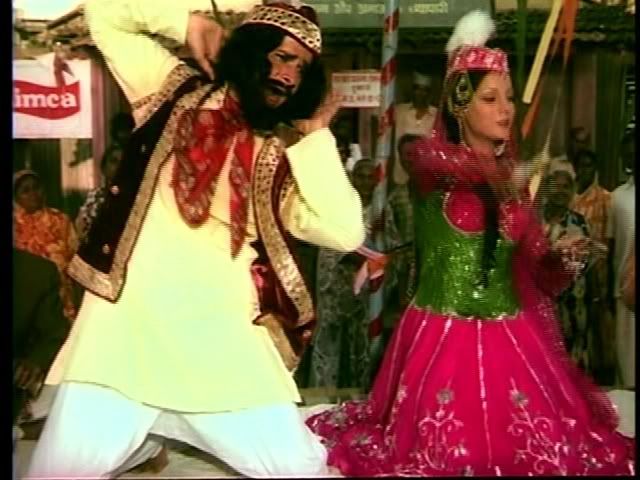
Kickin' it qawwali style!
A little bit Saudi.
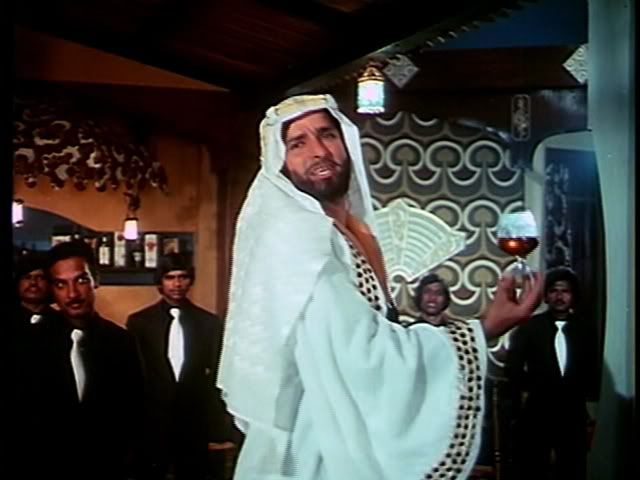
Kickin' it OPEC style!
Then a quick and violent decline into muffin tops and bandanas and, Bollywood Fugly writers, if you need more pictures, just ask.
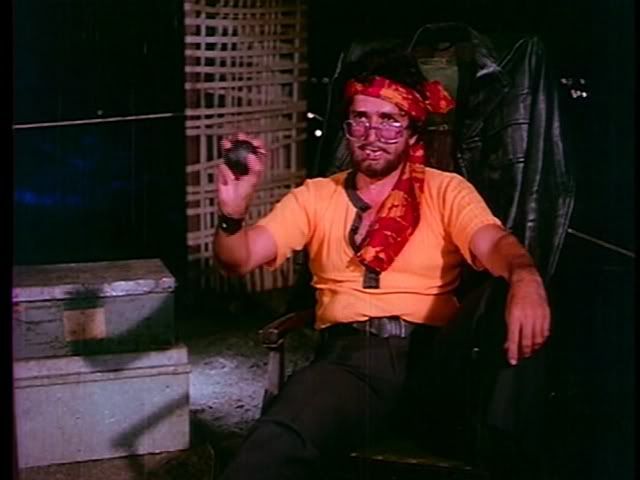
Not kicking any style anymore.
And then a spectacular ascent into sights unseen of aesthetic perfection. It's really the big tinted glasses and the pipe that does it in for the PPCC. Could he be any sexier? The answer is no.
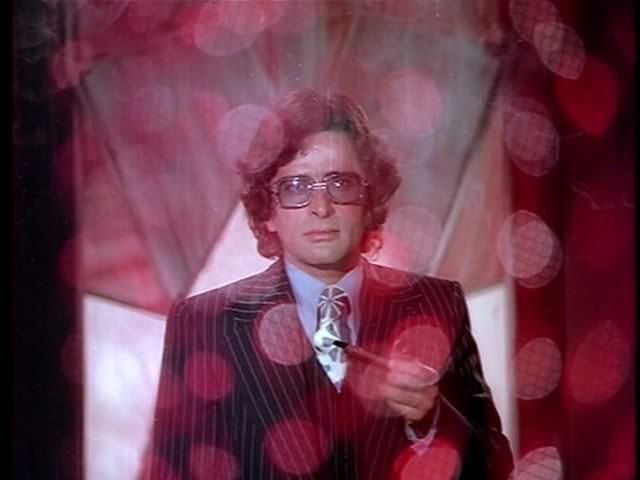
Kickin' it bad-ass groovy suave style.
The plot of Chor Sipahee is a joy. First, there is the bestial, boyish Raja (Vinod Khanna), a petty crime boss, always in and out of jail. His mother (Durga Khote) and sister, Bharti (Parveen Babi), are getting desperate: they beg Raja to give up his life of crime. Bharti even goes so far as to throw Raja out of the house; she's a newspaper reporter of the blackmailing, muck-raking variety, and she can support the family if need be. Raja hence moves into his criminal lair: the floor of an unfinished building which interestingly has no walls. Enter Shankar (Shashi Kapoor), described above, who has just returned to Bombay after slumming it around India, trying to clean up the urban centers (so far, he's had success in Delhi and Calcutta). Shankar is a maverick in the police force; his father was a convicted criminal who was hanged, the grief of which led his mother to kill herself. This dark and disturbing past has given him sympathy for and identification with the criminal underworld, as well as a strong anti-capital punishment stance, obviously. Shankar is completely against punishment, and completely for rehabilitation via an appeal to the criminals' humanity. After all, that chor (thief) was probably someone's father (Vijay and Ravi certainly know about that!) or husband or brother or son.
When Shankar meets Raja, he immediately sees a chance to belatedly and spiritually save his father, and so embarks on a quest to rehabilitate Raja. Raja, however, remains unenlightened and brutish: he slaps his sister, he drinks and steals, and, when Shankar makes the ultimate sacrifice of burning evidence in order to get Raja out of jail, Raja merely runs back to the Saudi crime boss whose business he covets. (Parenthetically, the crime boss, Jamal (Ranjeet), looks a lot like SRK circa Hey Ram.) Things become emotionally complicated, as per filmi usual. Raja misinterprets Shankar's help as the hand of friendship, and yet Shankar dismisses these appeals in the song, "Chor Sipahee mein hoti dosti nehi!" A thief and a policeman can never be friends. Raja is understandably hurt. And Raja is then bewildered when Shankar joins the criminal gang, rises to the top, and begins to out-evil the evil Jamal. (Wait, does this mean we can be friends now?) What he doesn't realize is that Shankar has decided to disgust Raja by showing him the logical extremes of being a villain: he proclaims that family means nothing anymore, he lets Bharti demean herself by dancing the booty-shake to a room full of lecherous goondas. As Shankar takes on more and more of Raja's sins, Raja is effectively wiped clean (like a Clean Slate - Kora Kagaz! see below), eventually rebelling against a life of crime altogether. Once Raja is purified, Shankar must pay for his criminality, even it is was faux, and he goes to prison. By this point, it has been revealed that Shankar's intentions were sacrificial - he was a "mirror" for Raja to see himself objectively in, he even sang in the initial song that if only criminals could see themselves from the outside, they would turn good - and hence Vinod Khanna is compelled, once again, to cry.
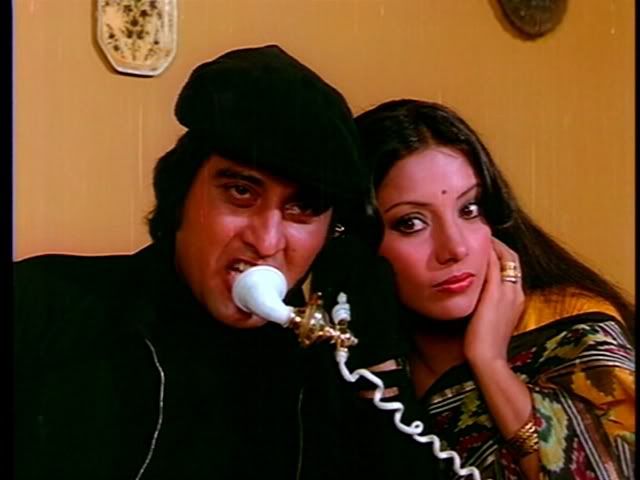
Vinod and Shabana. Shabinod? Vinabana?
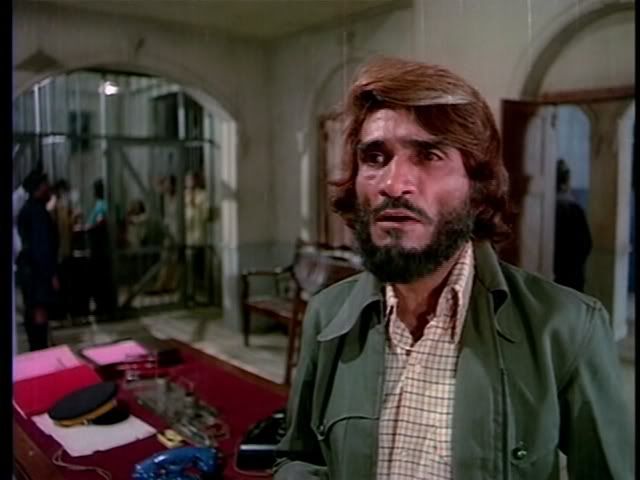
Sometimes I too can rock. MAC THE ROCK.
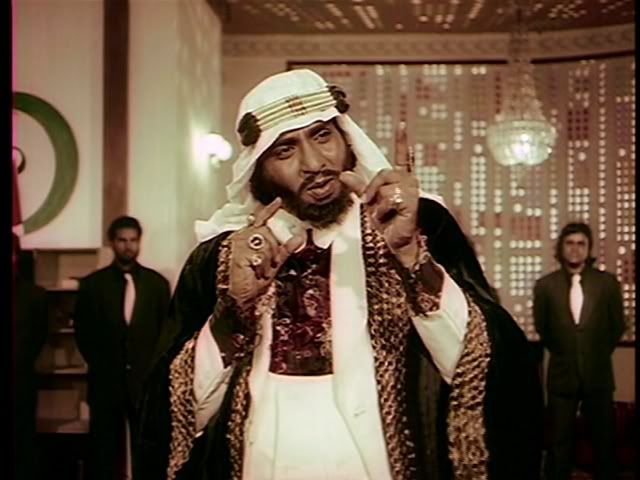
Ranjeet? Or Shah Rukh Khan?
Thematically, it's all very Dostoyevsky, very crime and punishment. The savage subject under study is Raja. He's brutish, yet lovable in that it's not cruelty that drives him but childish greed. In the opening credits, he is immediately identified with children: he gets into a faux stand-off with a cheeky, fatherless kid named Kora Kagaz (Clean Slate) from the slum. Raja is, for all intents and purposes, a grown-up little boy. He pouts when his mother and sister refuse to accept his criminal activities, he throws tantrums, and he doesn't seem to understand what all the fuss is about. It's just stealing, who cares? In this respect, Shankar, the fallen angel character (and we shudder to type that because it's so cheesy-sounding but it is also accurate, so, well), is on the other end of the spectrum: the same age as Raja, and yet many years older. Indeed, Shankar is more often identified with father figures; whereas Raja is fatherless like little Kora Kagaz, Shankar has an uncle to report to (literally, his uncle's in the police force) and he lives eternally in the shadow of his father's mistakes and his father's death.
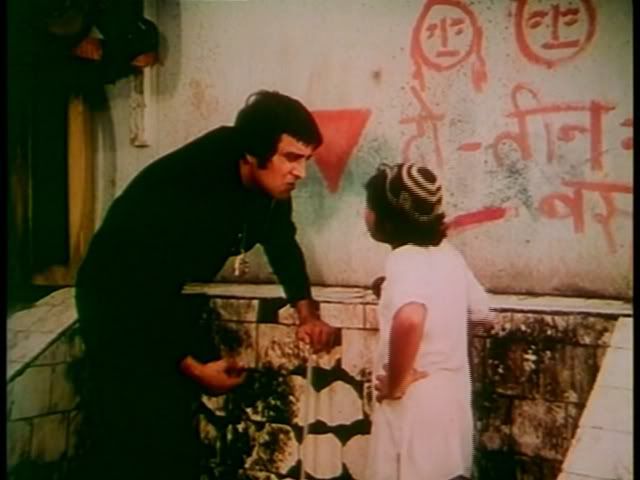
Raja, identified with children.
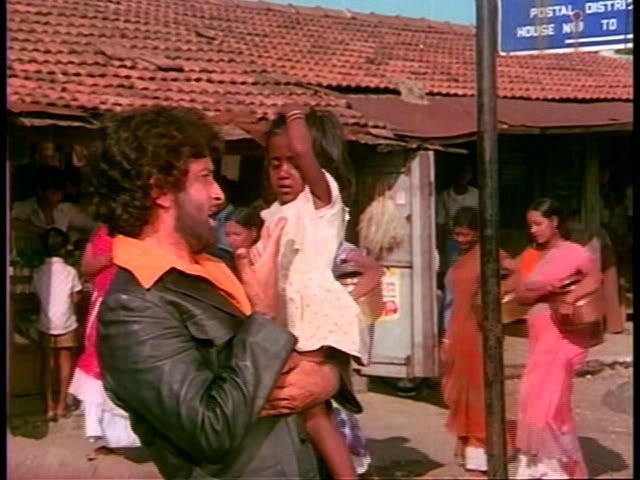
Shankar, identified with father figures.
Things become ironic in both text and aesthetics when, after Shankar sets Raja free, Raja joins the luxurious world of Jamal's gang, while Shankar rots away in jail, re-growing that beard of his. This juxtaposition between wealth and poverty, and this identification of wealth and poverty with immoral and moral, respectively, also gives the movie a Christian feel. And yeah, Shashi looks like a Tuscan-style Jesus, what with that beard and those curls and that look of sad, tired pity. Forgive Raja, society, for he knows not what he does! This "Godliness" is, naturally, intentional:
Raja's mother: Shankar!
Shankar: Shankar is the name of God. Only my name is Shankar. But I promise you, Mother. The line I have taken... I may burn in it, but I will bring back your Raja from that life of sin and crime.
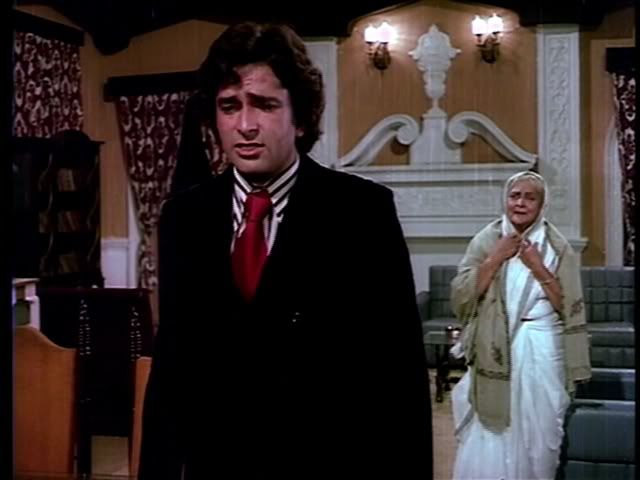
Sacrificing himself for others' sins? Hmmm.
We can take the Jesus parallels even further: Shankar's "lost years" wandering India, his return to Bombay at circa 33 where he proclaims that he has come to preach (the first song's lyrics: "I have come to you people, to teach you a lesson!"), his initial prison stint as the forty days in the desert, the ending where he allows himself to be "crucified" (well, prosecuted) for Raja's sins, descending briefly into hell (prison) before rising to heaven (his release from prison and his marriage and acquisition of a long-sought for family and, one would assume, peace of mind). OMG the more we think of it, the more it makes sense. Shankar is turn-the-other-cheek embodied, champion of forgiveness and champion of the poor and second chances! Why, this might be the most Christian-themed film we've seen since Children of Men!
For once, all these interesting themes and complexities are wonderfully mirrored in the female characters as well. Unlike Shankar, Raja's sister Bharti has reacted against familial thievery by becoming an ultimate punisher: she snaps photos of pickpockets at work and then exposes them in her newspaper. Meanwhile, the rich, bourgeoise Priya (Shabana Azmi) is the daughter of a legitimate yet immoral businessman, and she immediately joins up with Raja, seeing crime as the only way to achieve any real sense of social justice (this is all very Fakira, yes). Naturally, the four of them keep bumping into each other, and Raja falls for Priya (their courtship, by the by, is brief but very sweet), while Bharti falls for Shankar, as does her mom (what? it is Shashi!).
So we have four very interesting characters:
- Raja, who turns to crime due to his moral vacuum.
- Bharti, who turns to vigilante punishment due to her brother's crime.
- Shankar, who turns to vigilante forgiveness due to his father's crime.
- Priya, who turns to crime in the illegal sense due to her father's crimes in the immoral sense.
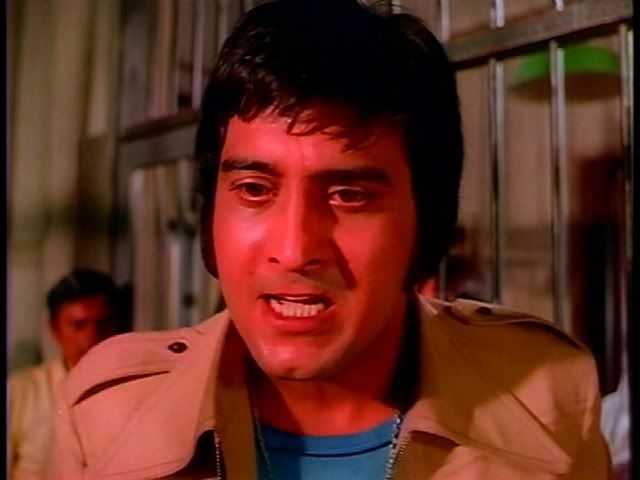 Vinod can't see what's the problem with thieving.
Vinod can't see what's the problem with thieving.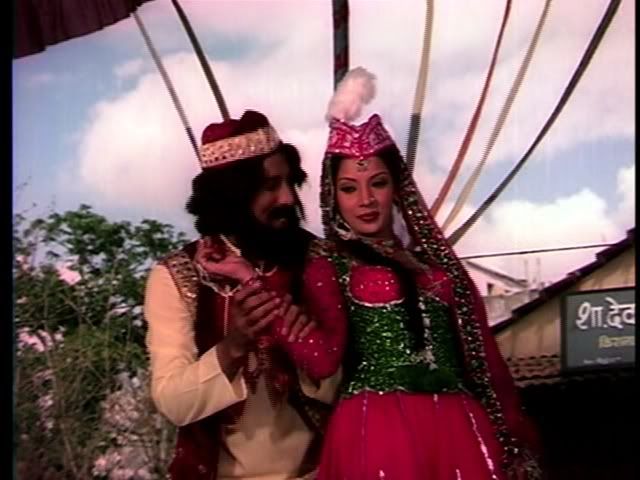 Duniya Hai Aati Jaati.
Duniya Hai Aati Jaati.

3 comments:
Pictures first - yes please, Bollywood Fugly would like more pictures. Thank you!
Please also post some snaps of Aruna Irani's too, as she was probably too there in this film as an guest appearance for a song (i guess,not sure).
Kindly please inform something about Aruna Irani's presence in this film.
Must say that great snaps you've taken! 70s style simply rocks and the best! isn't it?
I love how this review describes Shashi Kapoor’s costume evolution throughout the film.
Post a Comment